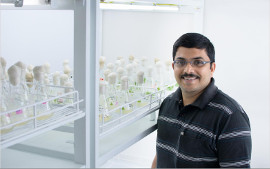Dr. P. V. Shivaprasad - Research
Summary
Epigenetic marks superimpose underlying DNA sequence of eukaryotes and provide considerable agility in modulating gene expression. Plants are ideal model systems to study epigenetics since their phenotypes are more likely influenced by epigenetics than among animals. We are interested in understanding epigenetic modifications that result in gene silencing involving small RNAs in plants.
Plant gene silencing and epigenetics
Research in our laboratory deals with molecules called small RNAs. Small RNAs are the key molecules resulting from RNA silencing pathways and they regulate both transcription and translation with the help of their protein partners. Small RNAs are also important factors in initiating and maintaining heritable changes in gene expression without changes in DNA sequence (called ‘epigenetics’). Small RNAs and epigenome modifications impact every aspect of eukaryotic development and disease. Contribution of individual small RNAs and epigenetic variations in phenotypes of plants are well documented but we really do not know how they work. We are interested in understanding the pathways that generate small RNAs and epigenome modifications to be able to use them effectively in plants. Our laboratory uses various biochemical, genetic, bioinformatic and whole-genome approaches in a wide variety of plants.
We use rice and its wild relatives to profile RNAs and look for variations in epigenome (such as DNA methylation and histone modifications) using whole-genome techniques. The idea is not only to generate fine map of genomic regions that show epigenetic and small RNA variations, but also to understand what contribution they have towards plant phenotypes and to understand how they are inherited. We also use various plant systems to isolate native protein complexes that generate small RNAs to identify partner proteins to help us understand how they bring about changes in transcription and translation. Once the role of a small RNA/epigenome modification for a given phenotype is identified, they can be introduced to plants through transcriptional gene silencing technology that relies on viruses to alter the epigenome. Our approach should facilitate us to generate crop plants with specific, useful and predictable phenotypes.
Interest in our lab is on three broad areas
A. Biogenesis and functions of small RNAs in various plant model systems.
B. Understanding small RNA directed Epigenetics using rice and its wild relatives as models.
C. Mechanism of action of core gene silencing proteins such as Dicer-Like (DCL) and Argonautes (AGO).



